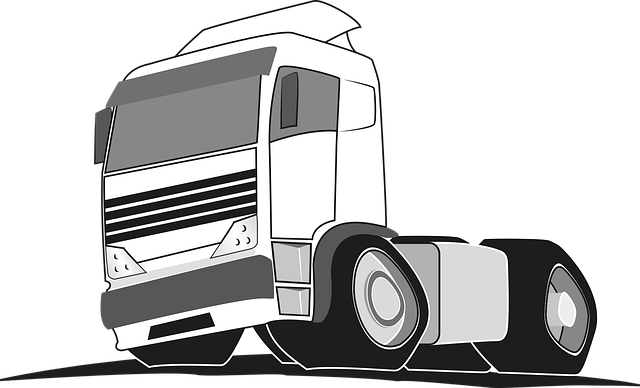The Vehicle Identification Number (VIN), a unique 17-character code, provides essential information about a truck's specifications, history, and authenticity. It is crucial for buyers to decode and check this number via authorized databases to obtain a comprehensive report on the vehicle's past, including accident records, mileage, and title history. Such reports help in assessing the condition and value of the truck, ensuring informed decision-making and protecting against heavy equipment fraud. A VIN check is indispensable for both personal use and commercial fleet expansion, as it reveals any issues or hidden damages that could lead to costly repairs or asset depreciation. It also helps in understanding the truck's maintenance history and accident records, which are vital for ensuring fleet efficiency and controlling long-term maintenance costs. Always review VIN reports carefully for potential red flags that may indicate reliability or safety concerns, such as frequent accidents, title changes, ownership swaps, odometer discrepancies, or reported frame damage. A thorough VIN report is a critical step in the vehicle acquisition process to avoid deceptive practices and ensure a sound investment.
When considering a pre-owned truck, due diligence extends beyond its current condition; understanding its history is paramount. A truck’s Vehicle Identification Number (VIN) serves as a unique identifier that can unlock past details, from accident records to previous ownership. With the rise of heavy equipment fraud, an overlooked vehicle history can lead to costly surprises post-purchase. This article will guide you through the critical steps of deciphering your truck’s VIN for essential information, emphasizing the importance of a thorough VIN check to protect your investment. We’ll explore how a quick VIN lookup can safeguard your purchase and ensure the truck aligns with your expectations. From navigating the nuances of VIN numbers to preventive measures against fraud, this comprehensive guide will arm you with the knowledge needed for an informed decision in the used truck market.
- Understanding Truck VIN Numbers and Their Importance
- How to Decipher Your Truck’s VIN for Essential Information
- The Role of Truck History Reports in Informed Purchasing Decisions
- Identifying Red Flags in a Truck’s VIN Report
- Steps to Obtain and Interpret an Instant Truck VIN Report
- Preventing Fraud: Protect Your Investment with a Thorough VIN Check
Understanding Truck VIN Numbers and Their Importance

A truck’s Vehicle Identification Number (VIN) is a unique 17-character code that serves as its fingerprint, encapsulating critical information about the vehicle’s make, model, year, and other essential details. This alphanumeric sequence is strategically placed on various parts of the truck, including the dashboard, door post, and the frame, ensuring its authenticity can be verified across different points of inspection. Deciphering a VIN number allows potential buyers to uncover a wealth of data, such as the truck’s history, manufacturing specifications, and any recorded accidents or title issues. This information is invaluable for anyone considering the purchase of a used truck, as it provides transparency and mitigates the risk of unforeseen complications post-transaction. Understanding a truck’s VIN is not just a step towards informed decision-making; it’s an indispensable due diligence measure that protects investments and safeguards against potential liabilities associated with heavy equipment fraud. A comprehensive VIN report, readily accessible through authorized databases, delivers a clear picture of the truck’s past, empowering buyers to make confident purchasing decisions.
How to Decipher Your Truck’s VIN for Essential Information

To effectively decipher your truck’s VIN for essential information, you must understand the significance of each segment within this 17-character string. The Vehicle Identification Number is a unique code that encapsulates critical details about a vehicle’s history and specifications. Begin by focusing on the first letter or group of digits, which denotes the country of manufacture and the type of vehicle. Following this, numbers four through eight provide insight into the truck’s model, brand, and its assembly plant.
The ninth digit is a check digit used to verify the integrity of the VIN. The tenth character signifies the truck’s body style, engine type, and chassis type. From the 11th to the 12th characters, you can determine the restraint system and the model year of the vehicle. The subsequent segment, from the 13th to the 17th position, is where detailed information about the truck’s production line, serial number, and specifications is encoded. This data is crucial for verifying the truck’s authenticity and assessing its history. By running a VIN lookup through a reputable service, you can access a comprehensive report that includes the vehicle’s accident history, mileage records, title history, and more. This due diligence is indispensable for ensuring the truck aligns with your expectations and for safeguarding against potential fraud or hidden issues.
The Role of Truck History Reports in Informed Purchasing Decisions

When contemplating the acquisition of a truck, whether for personal use or to expand a commercial fleet, obtaining a comprehensive history report is indispensable. These reports provide a detailed account of the vehicle’s past, which includes critical information such as accident history, odometer readings, title brands, and previous owners. By scrutinizing this data, potential buyers can make informed decisions, assessing the truck’s true condition and value. It allows for due diligence to ensure that the investment is sound and that any mechanical or legal issues are identified beforehand. This proactive approach helps mitigate risks associated with hidden damages or fraudulent activities that could otherwise lead to costly repairs or depreciation of the asset.
Furthermore, a truck’s history report serves as a crucial tool in understanding its operational history and reliability. Information on maintenance records can reveal how well the vehicle has been cared for, while accident history can signal potential weak points or necessary repairs. This transparency is essential, as it enables buyers to evaluate the truck against their specific needs and budgetary constraints. In the realm of commercial transportation, where uptime is paramount, such reports are not just a formality but a strategic asset in maintaining a fleet’s efficiency and reducing long-term costs associated with vehicle downtime or unscheduled maintenance.
Identifying Red Flags in a Truck’s VIN Report

When conducting a truck VIN lookup, certain red flags should immediately catch your attention. A history of accidents or frequent title changes can signal potential issues with the vehicle’s reliability or safety. An excessive number of previous owners may indicate a truck that has been difficult to retain long-term, possibly due to persistent problems. Additionally, be cautious of any reported frame or major component damage; such repairs can compromise the structural integrity and overall performance of the truck. It’s also advisable to scrutinize the odometer reading against the condition of the vehicle, as signs of wear that don’t align with the mileage could suggest odometer fraud, which might lead to more costly issues down the line. Always approach a truck VIN report with a critical eye, especially if any of these red flags appear in the truck’s history. A thorough examination of the VIN report can provide peace of mind and help you make an informed decision about your truck investment.
Steps to Obtain and Interpret an Instant Truck VIN Report

To obtain an instant truck VIN report, the first step is to locate the Vehicle Identification Number (VIN). This unique code is typically found on the vehicle’s dashboard near the windshield, on the driver’s side. It may also be present on the vehicle’s insurance card, registration document, or title. Once you have the VIN, you can use a reputable online service dedicated to truck VIN lookups. These services are designed to quickly access databases that contain the truck’s history, including its accident records, mileage changes, title history, and more.
Upon entering the VIN into the system, the report will generate a comprehensive summary of the vehicle’s past. This includes information such as previous owners, service and repair history, any reported accidents or damage, and whether the odometer has been rolled back. The report may also indicate if the truck has been exported and imported, which can affect its condition and value. Interpreting this report requires a discerning eye; look for patterns that might suggest negligence or prior issues that could impact your decision to purchase or invest in the truck. Pay close attention to any flags, such as frequent ownership changes, inconsistencies in odometer readings, or signs of significant damage from past accidents. These details can provide insight into the truck’s overall condition and help you make a more informed investment decision. Remember to verify the authenticity of the VIN report by cross-referencing the information with other available records for a complete picture of the truck’s history.
Preventing Fraud: Protect Your Investment with a Thorough VIN Check

When considering the purchase of a heavy-duty truck, due diligence is paramount to safeguard your investment from fraudulent activities. A critical step in this process is conducting a comprehensive Vehicle Identification Number (VIN) check. This check serves as an invaluable tool in uncovering the truck’s history, including any accidents it may have been involved in, the number of previous owners, and whether it has been properly maintained. Given the significant capital outlay for heavy trucks, a VIN lookup is not just a recommendation but an essential step to verify the truck’s authenticity and condition before finalizing the transaction. By leveraging databases that compile vehicle history records, you can ascertain the truck’s background, ensuring it aligns with your expectations and standards. This preventative measure can save you from the financial repercussions and operational setbacks associated with acquiring a truck with undisclosed issues or a dubious past. In essence, a thorough VIN check is a critical investment protection strategy in the realm of commercial vehicle procurement.
When considering the acquisition of a truck, whether for personal use or to expand a fleet, due diligence is paramount. An investment in a vehicle’s past, through a thorough VIN lookup, can illuminate critical information that affects its reliability and value. The article has outlined the importance of understanding a truck’s VIN number, deciphering it for essential information, and the pivotal role history reports play in informed purchasing decisions. It also highlighted the necessity of identifying potential issues through a VIN report to prevent fraudulent transactions. By following the outlined steps to obtain an instant truck VIN report, buyers can make confident, informed choices that protect their investment and ensure the longevity of their operation. In essence, a truck’s history is as important as its mechanical condition; both contribute to its overall value and integrity.



